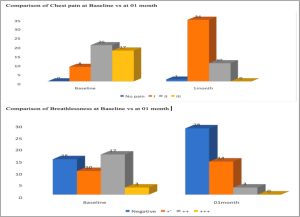
ABSTRACT
Background: This observational, prospective cross-sectional study aimed to assess the safety and efficacy of metoprolol and bisoprolol in the treatment of Coronary Artery Disease (CAD) patients. Materials and Methods: The study received institutional ethics approval and was conducted at a tertiary care private teaching hospital over six months. Ninety CAD patients were included, with demographics and clinical characteristics recorded. Vital signs were measured at baseline, 48 hr, 7 days, and 1 month. Angina severity was assessed using the Canadian Cardiovascular Society Grading Scale and New York Heart Association classification. Statistical analysis compared outcomes between metoprolol and bisoprolol groups. Results: Male patients (72.22%) received metoprolol more frequently, while bisoprolol was preferred among females (28.88%). Age had minimal influence on medication choice. Metoprolol-treated patients had higher Left Ventricular Ejection Fraction (LVEF) values (50.26%) compared to bisoprolol-treated patients (45.78%). Regional Wall Motion Abnormalities (RWMA) was similar between groups. Both medications effectively reduced hypertension severity and vital parameters, with significant reductions in Systolic Blood Pressure (SBP), Diastolic Blood Pressure (DBP), and Heart Rate (HR) with metoprolol. The prevalence of chest pain decreased in both groups, with Class III patients achieving complete relief. Breathlessness symptoms improved overall, with some patients experiencing relief while others showed reduced symptoms. Side effects were low in both groups, but metoprolol had a slightly higher incidence. Conclusion: Metoprolol and bisoprolol demonstrated safety and efficacy in managing CAD patients. Metoprolol showed advantages in LVEF improvement and greater reduction in SBP, DBP, and HR, but it had a slightly higher side effect incidence. Both medications effectively alleviated chest pain and breathlessness symptoms. This study provides valuable insights into the clinical characteristics and outcomes associated with metoprolol and bisoprolol in CAD patients, supporting their use in managing cardiac symptoms and hypertension
